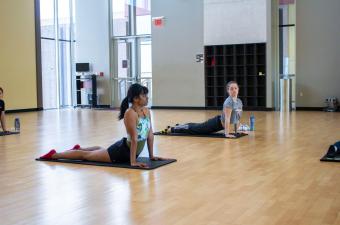Relieving Sore Muscles
Working out is a huge part of having a healthy lifestyle—it strengthens our heart and lungs, builds strong muscles and bones, and keeps our bodies performing at their best. While you undergo strengthening, part of the process can cause you to experience sore muscles and an achy body. This is especially true when starting a new regimen or when we increase the intensity of a workout, since new muscles are being used or we are putting extra strain on them. Soreness is a sign that our muscles are adjusting to the exercise and that they are growing and getting stronger.
Sometimes when we get muscle soreness from working out, we can’t just tough it out and would like some relief. Luckily there are a few remedies that can help soothe tired muscles and promote relaxation. Here are the top tips to calm aching muscles.
Stretching: Gentle stretching before your workout is something you may already incorporate in your routine, but stretching after finishing a workout can bring a world of benefits. It reduces the pain and soreness as well as reduces our risk of injury, since tight muscles are more prone to injury. By stretching and loosening our muscles, we reduce that risk. Another good thing about stretching is that it helps reduce the lactic acid that is built up from working out. Lactic acid can lead to sore and tired muscles, so when we stretch after an exercise session and reduce the lactic acid in our bodies, we experience less pain.
Massage: Massages feel good in general, but there are added benefits to getting a massage after working out. Not only will it feel very relaxing, but it will also relieve muscle tension that occurs after we exercise. A massage therapist does this by expertly reducing pressure from your muscles and your joints, lowering the chance of muscle spasms and cramps. Another thing that a massage provides is increased circulation around the whole body. This helps sore muscles by bringing oxygen rich blood and nutrients straight to them, bringing relief to the affected areas.
Hot Bath or Shower: Taking a hot bath or shower is a great way to loosen up tired muscles. In addition to it being soothing, the hot water also helps increase circulation which brings much needed blood and nutrition to your worn out muscles. If you opt for a bath, try it with epsom salts to increase the relief factor.
Ice: Sometimes ice on sore muscles really hits the spot. We can use blue ice, a bag of ice cubes, or even a bag of frozen vegetables—just be sure to prevent ice burns by wrapping your cold pack of choice in a towel or thin cloth. Putting ice on exhausted muscles helps reduce inflammation and swelling as well as help relieve the pain. If you decide to ice your muscles, take some time to contrast with some heat therapy afterwards to increase circulation throughout the muscles.
Over the Counter Pain Relievers: There are a couple of different types of pain relievers you can get over the counter. Those include medicines, creams, and gels. For medicine, a good option is a nonsteroidal anti-inflammatory drug such as Advil. When choosing a cream or gel to apply, aim for something that includes menthol or capsaicin such as IcyHot. Either of these options will help soothe sore and aching muscles.
